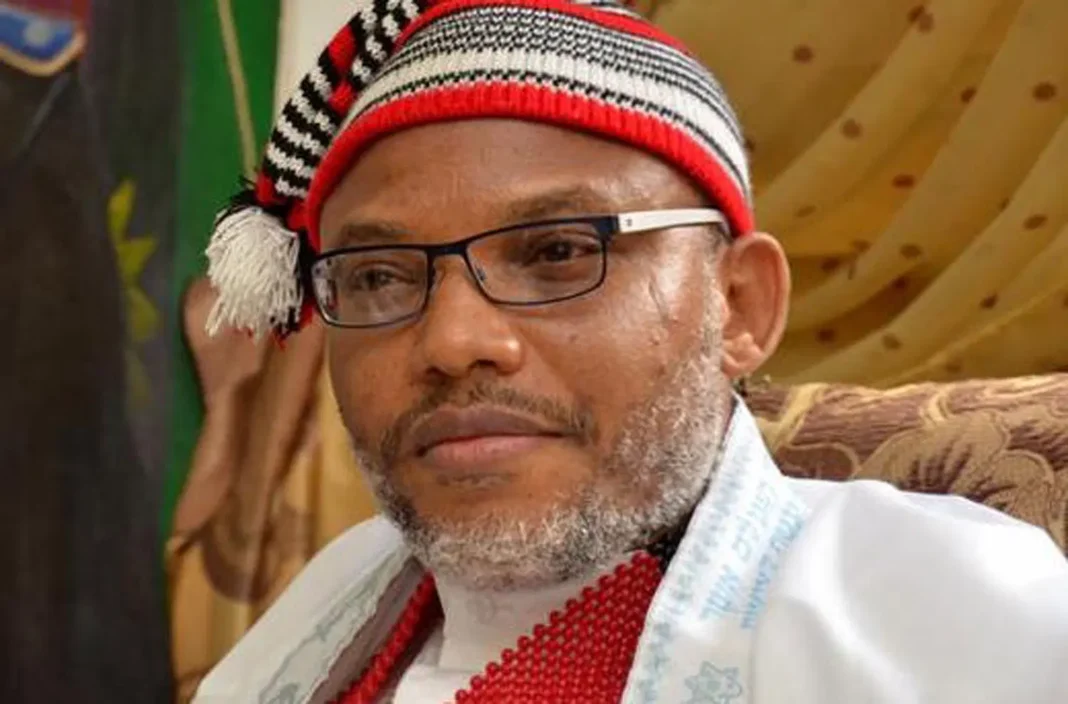The Federal High Court in Abuja on Thursday sentenced Nnamdi Kanu, leader of the Indigenous People of Biafra, to life imprisonment after finding him guilty on a string of terrorism offences that the prosecution said were carried out through incendiary broadcasts and directives issued to his followers over several years. The judgment, delivered by Justice James Omotosho, represents the culmination of a protracted and politically fraught legal battle that has stretched across a decade and touched on questions of extraordinary rendition, jurisdiction, and the scope of Nigeria’s terrorism laws.
The prosecution had pursued an amended seven-count charge sheet, which the Federal Government says captures the essence of Kanu’s activities since 2015. Although the dossier the government has filed against him has evolved, from an original 15 counts to the current 7-count indictment, the heart of the case advanced by the state was that Kanu, through Radio Biafra and other channels, made broadcasts and issued orders that amounted to acts in furtherance of terrorism as defined under the Terrorism (Prevention) Act and related laws. The counts, as described in filings and media summaries of the charge sheet, included allegations that Kanu made broadcasts that threatened the public and security services, incited followers to attack and kill security personnel and their families, issued a deadly threat tied to enforced sit-at-home directives, professed membership of and leadership in a proscribed organisation, and trafficked or imported radio transmission equipment used to broadcast extremist messages.
In the court’s detailed account of how it reached its decision, Justice Omotosho stressed that the prosecution had established a chain of evidence linking Kanu’s statements to acts that fell within the statutory definition of terrorism. The judge noted that the prosecution called several witnesses earlier in the year, and that many of the facts were supported by recordings, witness testimony and other documentary evidence showing that Radio Biafra messages had been monitored in various parts of the country and that sit-at-home orders and other directives were observed, with attendant economic loss and, in the government’s account, loss of life. The court also dismissed Kanu’s repeated procedural challenges and motions, including claims that his detention and return to Nigeria from abroad were unlawful extraordinary rendition, finding that those allegations lacked the oral evidence necessary to displace the prosecution’s case. The court observed that Kanu had been given opportunities to open his defence but had declined to lead oral witnesses to substantiate his extraordinary rendition claim.
The specific counts the court found proved track the evolution of the government’s case over successive filings. Count one accused Kanu of committing an act of terrorism by making broadcasts intended to intimidate and to incite violence, including threats that anyone flouting sit-at-home directives should “write his or her will.” Other counts the court sustained included allegations that Kanu incited his followers to hunt and kill security personnel and their families through radio broadcasts; that he professed to be a member and leader of a proscribed organisation, IPOB; and that he used or imported radio transmission equipment into the country to facilitate the dissemination of those broadcasts. The prosecution argued that those pronouncements and broadcasts were not merely political rhetoric but instructions that caused real harm in the form of closed businesses, grounded transport, economic losses, and deaths linked to enforcement or obedience to the directives.
Kanu’s conduct in court and his larger defence strategy were central to the way the trial unfolded. The defendant repeatedly challenged the court’s jurisdiction, asserting that the charges lacked a legal foundation and contending that his detention and return to Nigeria were unlawful extrajudicial acts. At times, he represented himself, and at others, he changed counsel. The trial record shows the court pressing Kanu to present a defence and calling on him to make good on promised witness lists, yet repeatedly noting that key allegations, such as the extraordinary rendition claim, required oral evidence which was not produced. Justice Omotosho told the court it had observed conduct by the defendant that it adjudged to be dilatory and obstructive, and the judge concluded that Kanu had effectively abandoned parts of the defence process. Those findings contributed to the court’s willingness to accept the prosecution’s narrative and enter convictions on the counts presented.
Legally, the defence can appeal the conviction and the sentence to higher courts, and issues such as the alleged extraordinary rendition and the precise application of the Terrorism (Prevention) Act will be central to any appellate challenge. Government authorities will face the challenge of managing security while seeking to avoid actions that might inflame local resentment or fuel further violence. Several federal lawmakers had, in recent days, urged President Bola Tinubu to consider dropping the charges and pursuing a political settlement, a plea that surfaced again in the immediate aftermath of the judgment.
Ultimately, the sentencing of Nnamdi Kanu today, after a protracted legal rigmarole that has persisted for over 10 years, signals the end of the much-debated stance of the judiciary on the charges which the Federal Government filed against him. The judgment settles the legal contest for now, but it still fails to resolve the political and social tension that has shaped the case for many years. Nigerians, and indeed, the international community, will keep watch to see how this resolution will affect the issue of national unity and justice.
Samuel Aina

